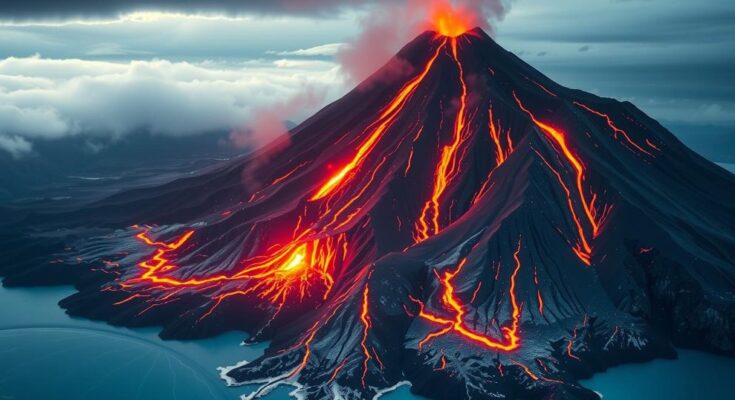Scholars warn that a major volcanic eruption could trigger global chaos, citing historical events such as Mount Tambora. Current geological studies suggest a one-in-six chance of a significant eruption this century. The ramifications could be catastrophic, affecting agriculture, climate, and human life. Experts urge for advanced preparedness plans to address potential disasters.
The looming threat of a significant volcanic eruption has scientists concerned about potential global disruptions. Historical eruptions, such as the 1815 Mount Tambora event, provide valuable insights, having led to catastrophic climatic changes, including failed crops and widespread famine. Current geological evidence suggests a notable risk of a similar eruption occurring this century, with experts estimating a one-in-six chance. In such an event, the global landscape would be severely affected, as noted by climate professor Markus Stoffel, who emphasizes the preparedness deficit regarding climate chaos.
Modern volcanic eruptions can release large quantities of sulfur dioxide, contributing to global cooling effects by scattering sunlight and forming aerosols that linger in the atmosphere. The consequences of such eruptions in today’s climate indicate an even greater potential for global temperature fluctuations, particularly given the warmer baseline climate. Thomas Aubry, a volcanologist, explains that the interaction of aerosols and atmospheric conditions could enhance the cooling effects after future eruptions, posing a significant risk to food security and socioeconomic stability.
Studies reveal that volcanic eruptions historically brought abrupt temperature declines, sometimes by as much as 1.5 degrees Celsius, impacting monsoon patterns and rainfall distributions. This may lead to dire repercussions for food production globally, especially in key agricultural regions. Notably, significant populations reside near active volcanoes, making immediate responses to eruptions crucial.
Though eruptions cannot be predicted accurately, there is an urgent need for strategic planning to manage worst-case scenarios. Scientists advocate for developing action plans to address potential catastrophic situations, ensuring society is not caught off-guard by future geological events. The increasing unpredictability of volcanic behavior, exacerbated by climate change, underscores the necessity for prepared responses.
As we advance, the pressing challenge remains: How does society equip itself against the powerful forces of nature, like volcanic eruptions, that have shaped our climate and influenced human history?
Volcanic eruptions have long been recognized for their profound impacts on Earth’s climate and human civilization. The most severe eruptions can lead to significant global cooling trends, crop failures, and widespread health crises. Historical events, such as the Mount Tambora eruption in 1815, serve as critical case studies for understanding the far-reaching effects of volcanic activity. With advancements in climate science and monitoring technology, researchers aim to better comprehend potential future eruptions and their risks, particularly as the planet experiences ongoing climate change.
In conclusion, the threat posed by future volcanic eruptions warrants urgent attention from scientists, policymakers, and society at large. Understanding the historical implications of significant volcanic activity provides crucial insights into preparing for potential disasters. As climate change intensifies and global populations increase near volatile volcanic regions, comprehensive preparedness strategies are essential to mitigate the disastrous consequences that future eruptions may bring.
Original Source: www.egyptindependent.com




